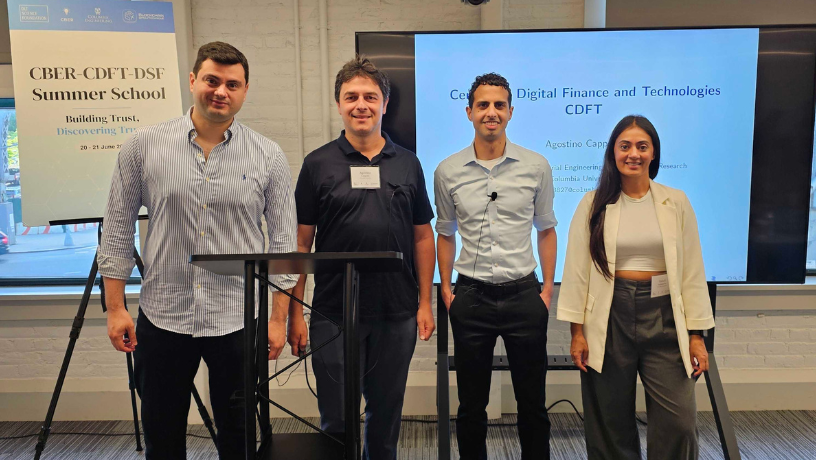Cryptoeconomics Summer School Brings Early Career Researchers to Campus
The Center for Digital Finance and Technology hosted researchers from around the world for a crash course in blockchain, cryptoeconomics, and decentralized finance.

More than 60 graduate students, postdoctoral researchers, and junior faculty members from across the U.S. and more than 20 countries convened at Columbia University on June 20-21, 2024, for the first-ever CBER-CDFT-DSF Summer School. The two-day workshop was aimed at researchers who wish to be educated and conduct research in crypto economics, blockchain and distributed ledger technologies, and Web 3.0. The event was hosted by the Crypto and Blockchain Economics Research Forum (CBER), Columbia’s Center for Digital Finance and Technologies (CDFT), and the DLT Science Foundation (DSF).
“This was a unique opportunity for students who are looking for PhD topics or want to specialize in these areas, as well as for faculty who want to contribute to research in blockchain economics and digital finance,” said Agostino Capponi, a professor of industrial engineering and operations research, director of the Center for Digital Finance and Technologies (CDFT), and a member of the Data Science Institute. “It was an opportunity to learn together through engaging discussion and interactions, rather than just reading papers or attending conferences convery specialized topics within this space.”
The workshop’s 11 speakers offered a broad overview of the areas in this space that are currently the subject of academic research, government regulation, and implementation in the private sector. The event was well received, with positive feedback encouraging the organizers to host the summer school on an annual basis.
Andreas Park, professor of finance at the University of Toronto, offered “a fantastic view of decentralized exchanges and how they’re changing the landscape of market microstructures,” Capponi said.
Presentations by Ciamac Moallemi, the William von Mueffling Professor of Business at Columbia Business School, on maximum extractable value drew significant interest from the students. Presentations by Fahad Saleh from the University of Florida provided an in-depth overview of the Ethereum ecosystem and smart contracts. In his own lectures, Capponi discussed proposer-builder-separation, pointing out how the design of current blockchains create inefficiencies and unfairness for certain participants.
“This is an important opportunity for Columbia to be at the heart of education and technological innovation in the decentralized technology space,” Capponi said. The event drew attention from academic institutions from Europe, Asia, and Australia, and from many corners of the private sector.
“This event is also important for the community, because it shows that the growing momentum of blockchain economics and digital finance are really here to stay.”
To stay up-to-date on the CDFT, register for the center’s newsletter or visit their website.
